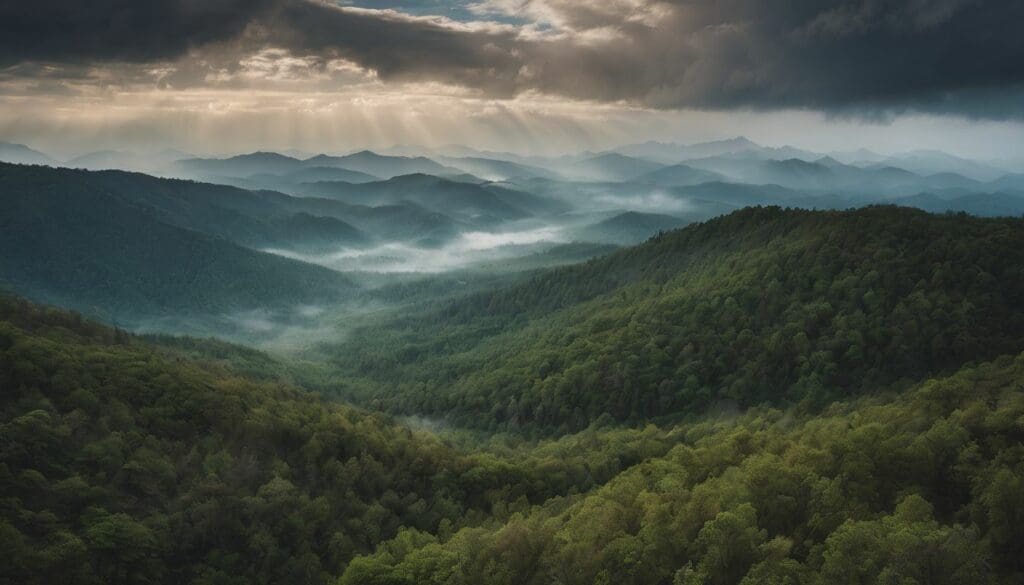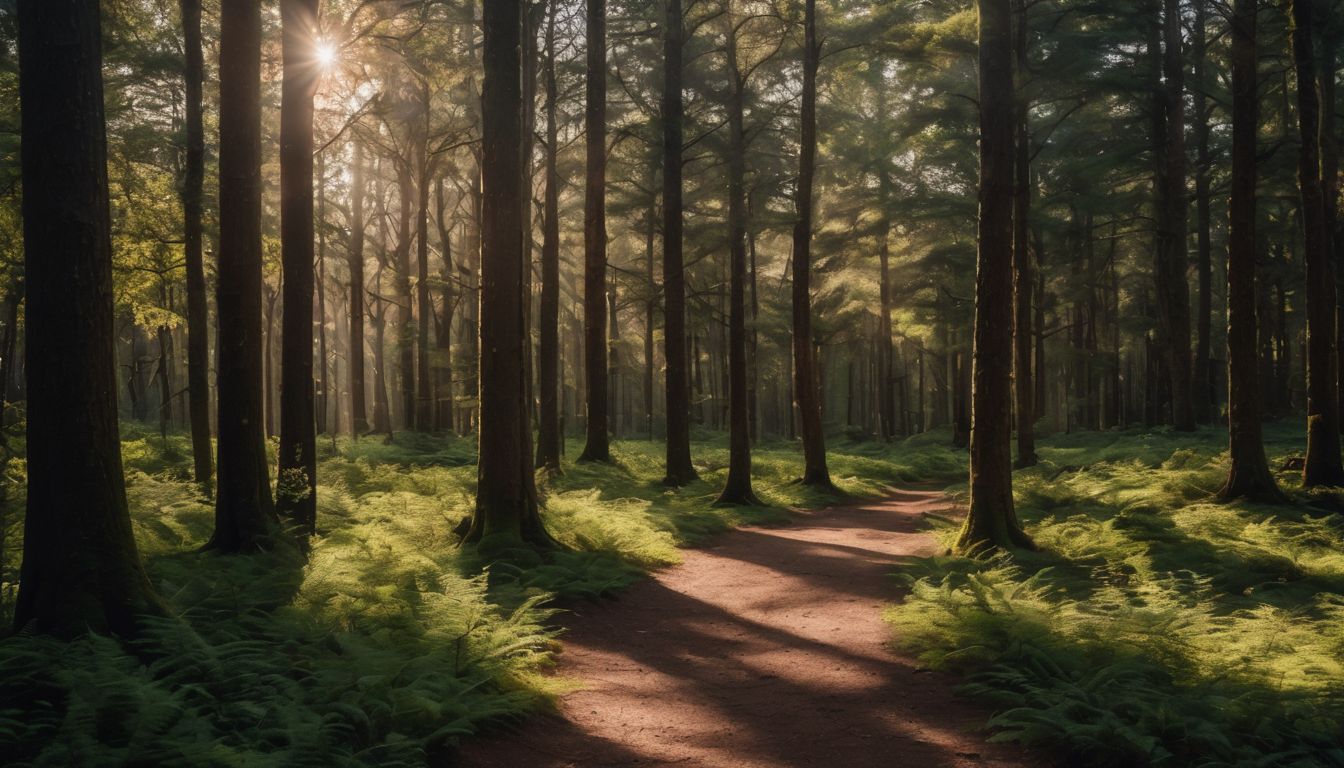Climate change is reshaping our world, but understanding it can be daunting. For years, I’ve delved into environmental science and media, witnessing first-hand how documentaries crystallise complex climate issues into compelling stories that stir the public’s heart.
By blending facts with emotive narratives, these films are not just informative—they’re transformative.
The force of cinema in igniting discourse and action on global warming cannot be overstated. Tales of melting Arctic glaciers or threatened wildlife have moved many to become eco-warriors.
My journey through the lens of environmental documentaries has shown me their power to rally collective will for a greener future. Keep reading; this article unveils films that do more than just entertain—they provoke us to save our planet.
Let’s dive in!
Key Takeaways
- Climate change documentaries use strong storytelling and visuals to make environmental issues relatable and urgent, motivating viewers to take action.
- Films like “An Inconvenient Truth,” “Chasing Ice,” and “Before the Flood” have significantly influenced public awareness and led to real-world changes in policy and individual behaviour.
- Streaming services increase accessibility of climate documentaries, allowing them to reach wider audiences and potentially inspire global action towards sustainability.
- Independent filmmakers contribute fresh perspectives on climate change, highlighting lesser-known issues and fostering deeper engagement with the subject matter.
- Advanced technology such as CGI, VR, and AR enhances the visual power of documentaries, making their messages more impactful and immersive for audiences.
The Power of Film in Shaping Public Perception of Climate Change and Global Warming
Notable climate change documentaries like “An Inconvenient Truth” and “Chasing Ice” have played a significant role in raising awareness about environmental issues. These films use powerful storytelling and compelling visuals to communicate the urgency of taking action against global warming.
Examples of movies/documentaries that have made an impact
Documentaries have become vital tools in illustrating the urgency of the climate crisis. They encourage viewers to reflect and inspire change through captivating narratives and striking visuals.
- “An Inconvenient Truth” (2006) features former US Vice President Al Gore’s campaign to educate people about global warming. This film opened many eyes to environmental concerns and played a significant role in bringing climate change to the public’s attention.
- “Chasing Ice” (2012) showcases the dramatic retreat of glaciers, providing visual evidence of climate change. James Balog’s use of time-lapse cameras paints a stark picture of melting Arctic glaciers that few can ignore.
- “Before the Flood” (2016), produced by Leonardo DiCaprio, explores the devastating impact of climate change on our planet. It delves into various aspects, from burning rainforests to melting polar ice caps, pushing for immediate action towards climate action.
- “Climate Refugees” (2010) brings attention to human stories behind global warming, focusing on populations displaced due to environmental disasters. This documentary highlights how global problems affect individuals, sparking dialogue on international aid and policy.
- The visually stunning “Chasing Coral” (2017) dives into ocean conservation by documenting the bleaching of coral reefs around the world. It serves as an urgent call to protect these underwater ecosystems from environmental degradation.
- “The Hottest August” (2019) portrays a collective portrait of society amidst growing concerns regarding future sustainability. Conversations with residents in New York City during August 2017 reveal diverse perspectives on economic stability and environmental solutions amidst rising temperatures.
- As ecoconscious cinema evolves, “This Changes Everything” (2015), based on Naomi Klein’s book, challenges current economic structures that contribute to environmental destruction. It encourages viewers to reimagine fulfilling lives without causing planetary harm.
How they raise awareness and spark action
Climate change documentaries and films are powerful tools in raising awareness about the urgent need to address the climate crisis. They provide a deep understanding of the impacts of climate change, making these global problems more tangible for viewers.
By illustrating real-world consequences and potential solutions, these films can spark action and inspire individuals to make positive changes in their own lives.
The storytelling in these documentaries motivates action by showing the human stories behind environmental degradation, global warming, animal agriculture, and other issues. Viewers are often moved to take steps towards sustainability after watching these impactful films.
Potential of Climate Change Movies to Become a Catalyst for Change
Climate change movies have the potential to inspire real-world change, such as influencing policy decisions and prompting environmental activism. The power of storytelling and compelling visuals can motivate action and drive positive impact in addressing climate crisis.
Examples of real-world change inspired by films
Documentaries and movies on climate change have sparked real-world changes, inspiring individuals, communities, and policymakers. Some powerful examples include the impact of “An Inconvenient Truth,” which led to heightened public awareness and political action on the issue. Similarly, “Before the Flood” motivated viewers to become more environmentally conscious and advocate for sustainable practices. Furthermore, “Chasing Ice” brought attention to melting glaciers, leading to increased support for conservation efforts in polar regions. Additionally, “The Hottest August” prompted discussions on local climate action and resilience in the face of extreme weather events. Moreover, “This Changes Everything” spurred conversations on environmental justice and community-led solutions. Lastly, “Climate Refugees” highlighted the human impact of climate change, influencing policies related to refugee protection and environmental migration.
The role of storytelling in motivating action
Storytelling serves as a powerful tool for motivating action on climate change. By weaving narratives that connect individuals to the real-world impacts of environmental issues, documentaries and movies can evoke empathy and inspire collective responsibility.
Through compelling storytelling, these films have the potential to drive meaningful change by highlighting the urgency of addressing global warming and offering viable solutions. Gripping narratives bring to light the consequences of inaction, encouraging viewers to engage with environmental activism and embrace sustainable practices.
Highlighting personal stories and showcasing tangible examples of positive change can help individuals envision their role in combating climate change. Documentaries such as “Before the Flood” and “An Inconvenient Truth” effectively harness storytelling to spur audiences into action, emphasising that everyone has a stake in preserving our planet’s future.
Moreover, by presenting success stories of conservation efforts or sustainable initiatives, these films affirm that individual actions can contribute to broader systemic transformation.
Latest Climate Change Documentaries to Watch in 2023
Don’t Look Up (2021), Princess Mononoke (1997), The Day the Earth Stood Still (2008), Before the Flood (2016), Eating Our Way to Extinction (2021) and 2040 (2019) are just a few of the latest climate change documentaries that are worth watching in 2023.
Don’t Look Up (2021)
“Don’t Look Up,” released in 2021, is a dark comedy film that powerfully addresses the urgent need for collective action on climate change. The movie showcases the struggle to convey the seriousness of a planet-threatening comet hurtling towards Earth, drawing parallels to how society grapples with acknowledging and responding to the looming threat of climate change.
Through satire and humor, “Don’t Look Up” highlights key issues such as political denial, media sensationalism, and public apathy – all barriers hindering swift action on environmental crises.
This thought-provoking film has resonated with audiences globally, igniting conversations about the state of our planet and encouraging individuals to advocate for meaningful change.
As we dive into the potential impact of films like “Don’t Look Up,”
Princess Mononoke (1997)
Princess Mononoke (1997) is a riveting animated film that delves into the complex relationship between humans and nature. It highlights the consequences of human actions on the environment, portraying the devastating impacts of industrialisation and deforestation.
With its captivating storytelling and stunning visuals, Princess Mononoke raises awareness about conservation and environmental degradation. The film effectively conveys the message that our actions have profound effects on the natural world, inspiring viewers to reconsider their role in preserving Earth’s delicate balance.
The narrative of Princess Mononoke serves as a poignant reminder of humanity’s interconnectedness with nature, shedding light on the urgent need for sustainable practices to combat environmental destruction.
The Day the Earth Stood Still (2008)
In “The Day the Earth Stood Still (2008),” viewers are challenged to confront the consequences of human actions on the planet. This science fiction film presents an extraterrestrial visitor who arrives on Earth to warn humanity about the destructive impact of their activities on the environment.
Through visually stunning scenes and a thought-provoking narrative, this movie highlights the urgent need for environmental stewardship and collective action to address climate change.
By watching this film, environmentally conscious individuals can gain a deeper understanding of the global warming crisis and be inspired to support conservation efforts.
“The Day the Earth Stood Still” emphasises that films have a significant role in shaping public perception of climate change and motivating real-world action. With captivating storytelling and powerful visuals, this movie effectively communicates the urgency of addressing environmental degradation and underscores humanity’s responsibility towards safeguarding the planet for future generations.
Before the Flood (2016)
Leonardo DiCaprio’s pivotal documentary “Before the Flood” confronts viewers with the harsh realities of climate change, exploring its far-reaching effects on our planet. The film delves into issues such as rising sea levels, deforestation, and the consequences of fossil fuel consumption.
It features interviews with world leaders, scientists, and activists and captures the urgency of addressing environmental degradation. By presenting a comprehensive look at climate change’s impact across different regions and ecosystems, “Before the Flood” compels audiences to consider their individual roles in mitigating this global crisis.
The documentary vividly illustrates how our choices directly influence the environment and emphasises that collective action is critical in safeguarding the planet for future generations.
Through breathtaking visuals and compelling narratives, “Before the Flood” serves as an influential catalyst for engaging individuals in conversations about sustainability while urging them to take meaningful steps towards conservation efforts – underscoring that we all have a role to play in protecting our planet.
Eating Our Way to Extinction (2021)
“Eating Our Way to Extinction (2021) sheds light on the environmental impact of animal agriculture, making it a must-watch for those concerned about sustainable living. The documentary presents compelling evidence on how our food choices contribute to climate change and environmental degradation.
By delving into the connection between meat consumption and greenhouse gas emissions, deforestation, and water pollution, this film urges viewers to consider the significant role they play in addressing the climate crisis.
Through powerful storytelling and stark visuals, Eating Our Way to Extinction offers an eye-opening perspective that can inspire individuals to make informed decisions regarding their diet and its impact on the planet.”.
The movie “Eating Our Way to Extinction” effectively communicates the urgency of reevaluating our dietary habits for a sustainable future. With a focus on conservation cinema and environmental awareness films, this documentary empowers audiences with critical knowledge about the environmental consequences of animal agriculture.
2040 (2019)
“2040” is a thought-provoking documentary that presents a positive and practical vision of the future. The film explores solutions to environmental challenges in an inspiring and informative way, making it accessible for both adults and younger audiences alike.
By envisioning what the year 2040 could look like with sustainable technologies and practices, this documentary instils hope while empowering viewers to take action towards a more sustainable future.
The film “2040” offers concrete examples of clean energy, regenerative agriculture, and other innovative solutions that can make a meaningful impact on climate change. Through relatable storytelling and engaging visuals, “2040” effectively conveys the message that individuals have the power to create positive change for our planet’s future.
The Future of Climate Change Movies
The impact of streaming services, the potential for independent filmmakers, and the role of technology in creating powerful visuals are shaping the future of climate change movies.
With advancements in storytelling and access to audiences, these films will continue to inspire action and drive real-world change.
The impact of streaming services
Streaming services have revolutionised the way climate change documentaries and films reach audiences. They provide easy accessibility to a wide range of environmentally focused content, allowing viewers to educate themselves about global warming, environmental degradation, and sustainable solutions.
Through platforms like Netflix, Amazon Prime, and Disney+, these impactful films can reach a broader audience than ever before. This increased accessibility has the potential to raise awareness on a global scale and inspire action towards addressing the pressing issues of climate change.
Additionally, streaming services offer a platform for independent filmmakers to showcase their work alongside mainstream productions, promoting diverse perspectives and storytelling styles.
The availability of high-quality visual technology on these platforms enhances the viewing experience, effectively conveying the urgency of climate action through powerful imagery.
The potential for independent filmmakers
Independent filmmakers have the potential to make a significant impact on climate change awareness through their unique storytelling and creative approaches. Their ability to tackle niche subjects in a thought-provoking manner can bring attention to lesser-known environmental issues, fostering greater understanding and action.
Independent films also provide an alternative perspective outside mainstream narratives, offering fresh insights that resonate with audiences seeking authentic and relatable stories.
These filmmakers often have more freedom to experiment with innovative techniques, allowing them to create visually stunning and emotionally compelling works that connect viewers on a personal level.
The role of technology in creating powerful visuals
Cutting-edge technology plays a pivotal role in crafting compelling visuals that communicate the urgent message of climate change documentaries. Advanced CGI, high-definition filming equipment, and innovative editing techniques are harnessed to vividly illustrate the impact of global warming on our planet.
By leveraging these technological tools, filmmakers can immerse audiences in breathtaking imagery, from melting polar ice caps to deforestation and extreme weather events. Such visually stunning representations serve as a potent call to action for viewers, compelling them to engage with environmental issues on a deeper level while igniting their passion for conservation.
Moreover, the integration of virtual reality (VR) and augmented reality (AR) in climate change documentaries offers an immersive experience that transports audiences directly into endangered ecosystems or disaster-stricken regions.
Conclusion
In conclusion, climate change documentaries and films have the power to inspire action and raise awareness about environmental issues. They provide a platform for storytelling that motivates individuals and communities to address the urgent need for collective action.
The potential of cinema as a catalyst for change is evident in the real-world impact of these powerful films. As we look ahead, the future holds promise for independent filmmakers and the continued use of technology to create impactful visuals that drive meaningful change.
FAQs
1. What are climate change documentaries?
Climate change documentaries are films that showcase the reality of global warming, the environmental degradation it causes, and share stories of eco-activism.
2. Why should I watch films about the climate crisis?
Watching documentary films on the climate crisis can inform you about important issues like melting Arctic glaciers and inspire you to take action for our planet.
3. Can blockbuster films effectively address ocean and environmental issues?
Yes, some blockbuster films on climate change powerfully highlight issues affecting our oceans and environment, motivating viewers towards sustainability.
4. Do these documentaries offer solutions to global warming?
Films like Climate Change Solutions Documentaries present actionable steps we all can take to combat global warming and protect our ecosystems.
5. Are there any movies that focus on animal agriculture’s impact on the environment?
Documentaries on Animal Agriculture delve into how farming practices contribute to environmental impact, urging a push for more environmentally friendly methods.





